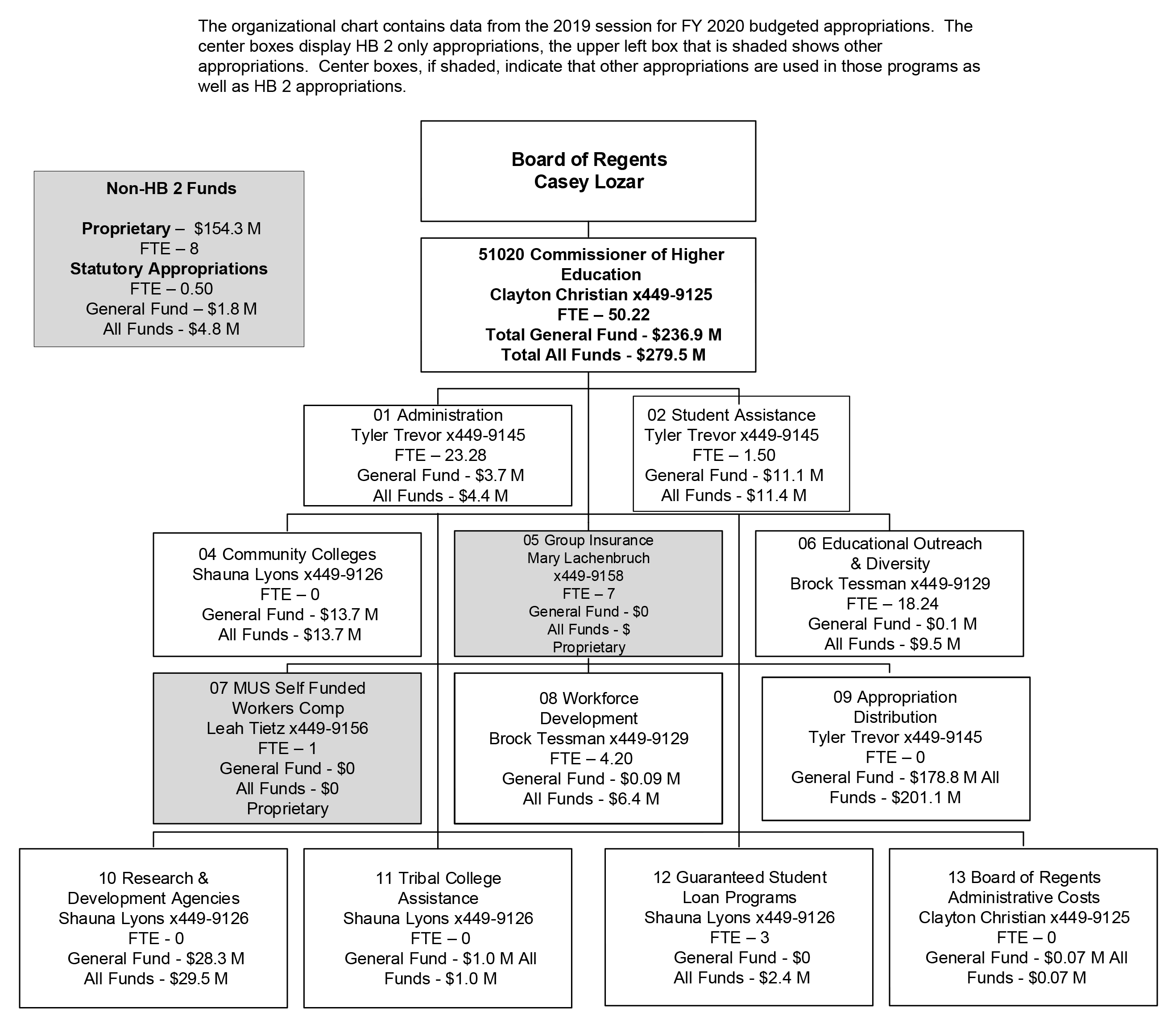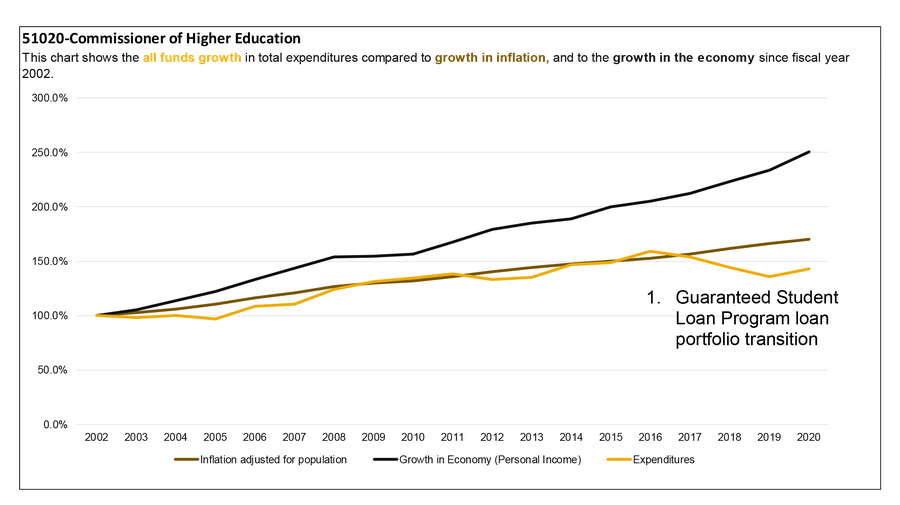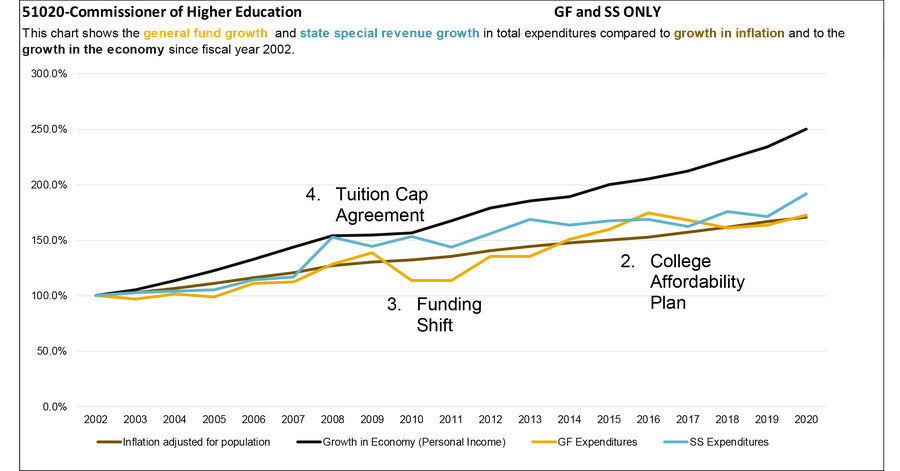Montana State Legislature
Commissioner of Higher Education
The mission of the Office of the Commissioner of Higher Education is to serve students through the delivery of high quality, accessible postsecondary educational opportunities, while actively participating in the preservation and advancement of Montana’s economy and society.
The Office of the Commissioner of Higher Education (OCHE) is the state-level administrative organization of the Montana University System (MUS). The Montana Constitution, Article X, Section 9, grants governance authority over the MUS to the Board of Regents (Regents), with seven members appointed by the Governor. All state funds appropriated by the legislature to the Regents for the support of the MUS are channeled through OCHE. The Constitution charges the Regents with hiring a Commissioner of Higher Education (CHE) who serves as its executive staff.
The Office of the Commissioner of Higher Education provides comprehensive administrative support and leadership for all units of the MUS, and includes the following programs:
- Board of Regents – the governing body for the MUS
- Guaranteed Student Loan Program – provides student financial aid related services to campuses and students
- Workforce Development Program – federal Perkins Grant administrator to support vocational education
- Student Assistance Program – financial support, including grants based upon merit and economic need, as well as work-study programs
- Educational Outreach & Diversity Program – academic support to low-income and at-risk students at the secondary school level to encourage postsecondary education upon high school graduation
- MUS Group Insurance and Self-Funded Workers’ Compensation – provides statewide administration of MUS employee health insurance and workers’ compensation insurance
The Montana University System operates the following program units with the following functions:
University Educational Units – provides postsecondary education to resident (Montana) and nonresident (out-of-state) students leading to undergraduate Associate and Bachelor degrees, and graduate education leading to Master’s and Doctorate degrees. The MUS also partners with business and industry to provide job skills education and training, as well as applied and basic research.
University of Montana (UM)
- University of Montana in Missoula
- Missoula College
- Montana Technological University in Butte
- Highlands College
- University of Montana Western in Dillon
- Helena College in Helena
Montana State University (MSU)
- Montana State University in Bozeman
- Gallatin College
- MSU-Billings in Billings
- City College
- MSU-Northern in Havre
- Great Falls College in Great Falls
Research Education and Public Service Agencies/Programs – combine research and education to serve students, communities, business, and the state providing knowledge in specific disciplines.
- Agricultural Experiment Station – research and experimentation in ag science at MSU
- Cooperative Extension Services – education-based applied research at MSU to assist community development
- Forestry and Conservation Experiment Station – provide scientific investigation of resource management and conservation at UM
- Bureau of Mines – provide research and advisory, technical, and information services on geologic, mineral, energy, and water resources, as well as research; with facilities in Butte and Billings
- Fire Services Training School – provide professional development and training for community fire and rescue service personnel, located in Great Falls
The Office of the Commissioner of Higher Education also distributes state appropriations to the community colleges and tribal colleges.
Community Colleges – three campuses provide postsecondary education, mostly to Montana students, leading to an Associate’s Degree, as well as job-specific certificate programs and skills training.
- Flathead Valley Community College in Kalispell and Libby
- Miles Community College in Miles City
- Dawson Community College in Glendive
Tribal College Assistance – financial assistance for tribal colleges for resident non-beneficiary (nontribal member) students who attend the seven tribal community colleges located on the reservations of Montana.
- Aaniiih Nakoda College in Fort Belknap
- Blackfeet Community College in Browning
- Chief Dull Knife College in Lame Deer
- Fort Peck Community College in Poplar
- Little Bighorn College in Crow Agency
- Salish Kootenai College in Pablo
- Stone Child College in Box Elder
Below is an organizational chart of OCHE, including full-time employee (FTE) numbers and the HB 2 general fund expenditures and the total expenditures from all funds.


This report includes a series of charts that compare expenditure growth to the growth in the economy and growth in inflation adjusted for population. Montana statute, 17-8-106, MCA, recommends using growth in personal income for comparison purposes. Personal income is a measure for growth in the economy. Comparing growth allows financial planners to consider past and future demands in services or changes in revenues.
Overall, the trend for expenditures related to all governmental funds in the Office of the Commission of Higher Education has followed the growth in inflation. The following list discusses in more detail the inflection points on the charts:
- The Guaranteed Student Loan (GSL) Program has not issued loans since July 2010 and has been managing the existing loan portfolio. As of October 1, 2017, the GSL Program transferred their portfolio to a federally approved loan servicing provider. This has caused a decline in federal special revenue expenditures

- The legislature approved appropriation increases in general fund and the six-mill levy to support the College Affordability Plan in an effort to cap university tuition rates in the 2009 biennium
- The legislature approved a funding switch from general fund to federal special revenue in the 2011 biennium. The state received one-time federal special revenue from the American Recovery and Reinvestment Act and used these funds to supplement general fund expenditures
- The legislature signed a Tuition Cap Agreement with the Commissioner of Higher Education and the Governor, which froze resident tuition rates over the 2017 biennium. This agreement also committed the Montana University System to incorporating a performance funding component into the allocation model used by the Board of Regents for distributing funds to the Montana University System educational units
Legislative Changes
2019 Legislature
- The legislature passed HB 341, which established a $250,000 statutory appropriation for the Montana Bureau of Mines and Geology (MBMG). This bill directs the MBMG to develop and implement a ground water investigation program for the purpose of collecting and compiling ground water and aquifer data. The statutory appropriation terminates July 1, 2023
- The Legislature passed HB 657 for an interim study directed by the Legislative Finance Committee that focused on the community college funding formula and postsecondary career and technical education (CTE). The intent was to establish an effective formula for calculating community college appropriations while taking into consideration the many factors that currently contribute to the formula.
- The legislature passed HB 754 for a study commission to review the history and structure of 2-year education within the Montana University System (MUS).
- The legislature passed SB 60 which revised laws related to financial aid for resident Montana students. This bill clarified the funding and distribution of science, technology, engineering, and math (STEM) scholarships and establishes a program to provide financial aid to resident Montana postsecondary undergraduate and graduate students. The statutory appropriation for STEM scholarships will continue to be funded with revenue from lottery proceeds, however, STEM scholarships will be funded with the first dollars before the remaining lottery proceeds are transferred to the general fund. Scholarships will be awarded up to $6,000 over four years of college as long as students continue to meet the criteria set forth in 20-26-616, MCA.
2017 Legislature
- The legislature signed a shared policy goal with the Commissioner of Higher Education and the executive to establish efficiency benchmarks for the state support per resident FTE
- The legislature approved the expansion of the family practice rural residency program to include the addition of psychiatry residency slots
2015 Legislature
- The legislature created the Research and Development Agencies Program. This program includes:
- Agricultural Experiment Station (AES)
- Extension Service (ES)
- Forestry and Conservation Experiment Station (FCES)
- Montana Bureau of Mines and Geology (MBMG)
- Fire Services Training School (FSTS)
- The legislature approved a $15.0 million restricted, one-time-only appropriation for the Montana Research and Economic Development Initiative (MREDI)
- The legislature endorsed the HB 2 portion of the Governor’s proposed tuition cap. The agreement also commits the Montana University System to incorporating a performance funding component into the allocation model used by the Board of Regents for distributing funds to the MUS educational units
Click the double-sided arrow in the lower right corner of the image below to enlarge the graphic. Then, click the box next to the agency you want to see. To minimize, click Esc.
Legislative Studies
Education Interim Committee work
Audit Reports
Financial Compliance Audit - Office of the Commissioner of Higher Education - June 2019
Legislation
HB 43 and fiscal note, Expand practice of telemedicine
HB 67 Revise community college funding laws
HB 100 Revise community college audit requirements
HB 129 Revise the Family Education Savings Act
HB 179, Revise laws related to community colleges
HB 206, Revise education laws related to tuition and in-state treatment
HB 218, Revise campus free speech laws
HB 219, Create computer coding student employment pilot program
HB 262, Expand exemptions from collections to include student loans
HB 283, Revise workers’ compensation laws relating to student interns
SB 25 Revise duties of Education Interim Committee regarding MUS
SB 46 and fiscal note, Increase MUS-RP supplemental contribution to TRS
Gov. Gianforte 2023 Biennium Budget - Commissioner of Higher Education
2023 Biennium Executive Summary - Commissioner of Higher Education
Jan. 5 Budget
Commissioner of Higher Education
Nov. 15 Budget
Commissioner of Higher Education Summary
- 01-Administration Program
- 02-Student Assistance Program
- 04-Community College Assistance
- 05-MUS Group Insurance Program
- 06-Educational Outreach & Diversity
- 07-MUS Workers Comp Program
- 08-Perkins
- 09-Appropriation Distribution
- 10-Research & Development Agencies
- 11-Tribal College
- 12-Guaranteed Student Loan
- 13-Board of Regents
Agency profile information provided by the Legislative Fiscal Division.
